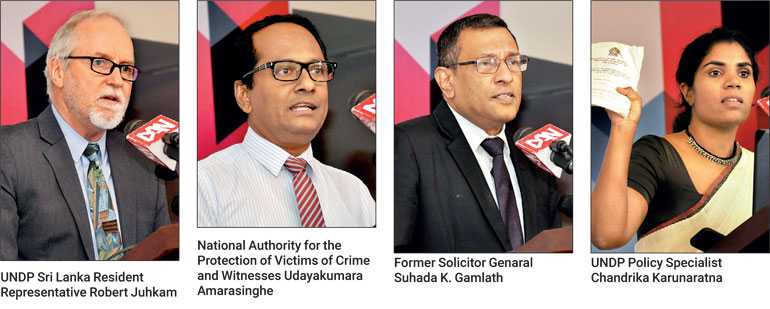Tuesday Feb 24, 2026
Tuesday Feb 24, 2026
Monday, 13 January 2020 08:31 - - {{hitsCtrl.values.hits}}

The National Authority for the Protection of Victims of Crime and Witnesses (NAPVCW) last weeke called on the public to be more forthcoming in the reporting of crimes, especially those related to domestic violence, rape and child abuse, as the law protects the victim.
According to the NAPVCW, many citizens are unaware of the protection and privileges offered to victims and witnesses by law and do not report crimes nor step forward as a witness. Crimes, especially ones related domestic violence, rape, sexual abuse and child abuse, go unreported often due to fear of stigmatisation, cultural perceptions, social alienation, and a lack of faith in law enforcement and the Judiciary.
The call for the public to be more forthcoming came at an event organised by the NAPVCW yesterday morning where members of the media were part of an awareness program. The Protection of Victims of Crime and Witnesses Act No.4 of 2015, which, for the first time in Sri Lanka, offers a range of protection, assistance and privileges for victims and witnesses alike, is a turning point in Sri Lankan jurisprudence. The National Authority also called on the media industry to more aware of new laws governing reporting on crime, victims, and witnesses.
“The media has a big role to play in educating the public about this law, and it also has a responsibility to uphold the law” said NAPVCW Director-General Udayakumara Amarasinghe.
“You need to balance the public right to information with the rights of the victims and witnesses,” opined Attorney-at-Law and UNDP Policy Specialist Chandrika Karunaratna.
Karunaratna explained that exposure of vulnerable victims (children, women and those who have been raped or sexually abused) can negatively impact that individual, their family and friends, and complicate the justice mechanisms. ‘Trial by media’ also calls in to question the moral and ethical obligations which media institutions are bound by, she said.
Karunaratna advised members of the media to be up to date on the new law, pointing out that the release of information on suspects, victims and witnesses which may put them in risk of retribution and is a punishable offence under the Act. She highlighted the need for media institutions to practice high standards of professionalism when reporting on crimes.
Addressing the gathering, former Solicitor General Suhada Gamlath stated that there had been a long-felt need for an independent and prompt mechanism to grant protection for victims and witnesses, pointing out that historically, it was the rights of the accused that were protected.
Gamlath pointed out that media was the fourth pillar of democracy along with the Judiciary, Legislature and Executive, and that the protections offered to the vulnerable individuals (victims and witnesses) needed to be understood and upheld by journalists and editors.
“A hallmark of a successful protection structure lies in the independence and promptness of the response mechanism. It must be capable of enabling trust in a process because a victim’s or witness’ reluctance to partake in the process may be due to fear of retaliation. A strengthened protection mechanism also serves to encourage witness testimony,” said UNDP Resident Representative Robert Juhkam, commenting on the impact organisations like NAPVCW can make.
According to Juhkam, the United Nations Development Program (UNDP) in Sri Lanka supports the NAPVCW in policy, expanding the knowledge base and technical matters, and has done so for the past two decades.
The NAPVCW is mandated to offer protection and assistance to victims and witnesses who fear retaliation. If anyone fears reporting a crime to the Police or if the alleged crime involves the Police, the complainants can report the crime to the NAPVCW directly in person, by mail, or via their hotline 1985.
Pix by Lasantha Kumara